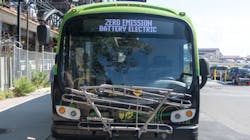NJ Transit commits to transitioning to zero-emission fleet by 2040
New Jersey Transit (NJ Transit) will aim to have a zero-emission bus fleet by 2040 and has unveiled a roadmap to help achieve this goal.
The news came at the agency’s Board of Directors Energy & Sustainability Committee meeting on May 25.
To support the transition efforts, the agency has applied for a federal grant to acquire battery electric buses and issued a Request for Proposals (RFP) from qualified consulting firms for its Bus Garage Modernization Program.
“The roadmap to achieving a 100 percent zero-emissions bus fleet by 2040 is establishing the foundation that will ultimately create NJ Transit’s environmentally-friendly fleet of the future,” said NJ Transit Board Vice-Chair Cedrick T. Fulton. “Advancing the modernization of NJ Transit’s bus garages and applying for additional federal funding for electric buses are critical steps to meeting this very ambitious and important goal.”
The state of New Jersey has a goal to transition to 100 percent clean energy by 2050 and NJ Transit has taken initial steps to support this goal. In September 2020, NJ Transit awarded a contract to renovate its Newton Avenue Bus Garage with electric vehicle charging stations and other infrastructure modifications in anticipation of its first eight electric buses entering service in mid-2021 as part of a pilot project in Camden.
NJ Transit notes the Camden project is a first of its kind initiative for the transit agency and the pilot will provide information not only on fleet statistics, but on what kind of charging and power infrastructure is needed at garages to keep the buses in service.
The state energy plan calls for NJ Transit to have at least 10 percent of its new buses be zero emission by Dec. 31, 2024; 50 percent of its new buses should be zero emission by Dec. 31, 2026, and 100 percent of new bus purchases will be zero emission by Dec. 31, 2032.
“NJ Transit remains wholly committed to transitioning to a 100 percent zero-emissions bus fleet by 2040, aligned with Gov. [Phil] Murphy’s Energy Master Plan,” said NJ Transit President & CEO Kevin S. Corbett. “While we have laid out aggressive plans to achieve this milestone, we are moving forward deliberatively by leveraging relationships with our peer agencies, both nationally and internationally, to learn from their experiences and ensure our success.”
Office of Climate Action and the Green Economy Director Jane Cohen added, “NJ Transit is a major component of New Jersey’s infrastructure and the electrification of their bus fleet is an important step in achieving environmental justice and equity. NJ Transit working aggressively to implement these initiatives is a key step towards reaching Gov. Murphy’s clean energy and environmental justice goals.”
Following work on its Newton Avenue Bus Garage, NJ Transit is targeting Maplewood’s Hilton Garage next for modernization to accommodate electric buses in the Newark region. Ultimately, NJ Transit’s 16 existing garages will undergo modernization.
An RFP with a submission deadline of July 13 has been issued for a three-stage modernization of NJ Transit’s bus garages. The goal of the project is to “renovate and transform” the existing garages to handle future zero-emissions buses.
The stages include:
- Stage 1 – 100 percent design for eight charging stations at Hilton garage, 10 percent design at all other garages, as well as a systemwide survey of all 16 garages to document existing conditions.
- Stage 2 - Additional modernization design at Newton Avenue Garage and modernization design of the following four garages: Wayne Garage, Hamilton Garage, Hilton Garage and Greenville Garage.
- Stage 3 - Final design for Hamilton, Hilton, Newton, Greenville, Wayne Garages and the development of the Operations & Maintenance and Technology Plan.
NJ Transit anticipates a selection for a consultant to be made later this summer.
On the vehicle front, NJ Transit applied for a grant through the Federal Transit Administration's (FTA) Low or No Emissions Grant Program, which opened a $180-million funding opportunity for the latest round of grants.
Should NJ Transit be selected for a $10.5-million award, the state would contribute an additional $4.5 million through its Transportation Trust Fund for a total grant of $15 million. The funds would be used to purchase eight articulated electric buses to replace eight 40-foot diesel buses operating on the No. 25 line. The buses would be housed at the Hilton Bus Garage and would serve a community considered environmentally overburdened.
NJ Transit says the grant money would build on an initiative already underway to add zero-emission vehicles on the No. 25 line. In 2020, NJ Transit received more than $7 million from the FTA for the procurement of battery electric buses, which was partly matched by $3 million in state transportation trust funds. Additionally, the state board of public utilities has already committed approximately $10 million for supporting infrastructure upgrades such as charging equipment at Hilton Garage.
About the Author

Mischa Wanek-Libman
Group Editorial Director
Mischa Wanek-Libman is director of communications with Transdev North America. She has more than 20 years of experience working in the transportation industry covering construction projects, engineering challenges, transit and rail operations and best practices.
Wanek-Libman has held top editorial positions at freight rail and public transportation business-to-business publications including as editor-in-chief and editorial director of Mass Transit from 2018-2024. She has been recognized for editorial excellence through her individual work, as well as for collaborative content.
She is an active member of the American Public Transportation Association's Marketing and Communications Committee and served 14 years as a Board Observer on the National Railroad Construction and Maintenance Association (NRC) Board of Directors.
She is a graduate of Drake University in Des Moines, Iowa, where she earned a Bachelor of Arts degree in Journalism and Mass Communication.
